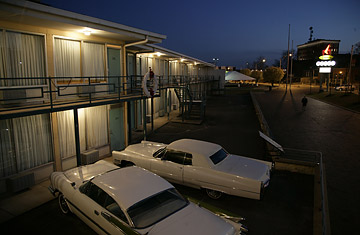
The Lorraine Motel as it looks today. It is now a civil rights museum.
Memphis was a place none of them expected to be on April 4, 1968. A garbage strike diverted them to Tennessee, away from their planned trip to the nation's capitol to lobby Congress for a poor people's bill of rights.
They each spent their day on different tasks.
The Aides
Andrew Young, 36, had been in a Memphis court fighting an injunction so that the Southern Christian Leadership Conference (SCLC) could help organize a second march of the garbage workers — the first had ended violently. When he joined King at the Lorraine Motel, he was playfully chastised for not calling to let King know his whereabouts.
Jesse Jackson , 27, had spent the day helping to plan the SCLC's activities in Washington. He also brought down a band affiliated with Operation Breadbasket, a community organizing arm of SCLC that Jackson was running. He had rehearsed freedom songs with them in his room at the Lorraine Motel.
James Bevel, 31, had holed up at Clayburn Temple with Rev. James Orange. The two were training young people to ensure that the earlier violence, which had marred the garbage strike, would not repeat itself. He was excited to tell King about the progress he had made on his return to the motel.
Samuel "Billy" Kyles , 33, had come to the Lorraine to pick everyone up for a dinner scheduled before a rally that night. The meal was supposed to have been at five, but Kyles was used to King being tardy for social appointments.
Their Stories
TIME spoke to these four men — the last living aides of Martin Luther King, Jr., who were all within ten feet of him at 6:01 p.m. when a hard, deliberate shot changed the world. Jackson, Young and Bevel were in the parking lot of the Lorraine, Kyles on the balcony, starting toward the stairs. Any one of them could have been hit as well, but the shooter found his intended target with a single shot.
The assassination continues to bewilder the men. Young has only returned to Memphis once since the shooting. "One of the disturbing features about that day for us was that when we were pointing, we were pointing over across the street. There was a building there, but there was also a six-to-eight-foot pile of bushes and some people thought that the shot came from the bushes. The FBI said it came from a bathroom window. But when we got up the next morning, those bushes were gone."
Young, Bevel, Jackson and Kyles told TIME that although they witnessed everything that happened, no authority from the Memphis Police, the Tennessee State Police or the FBI have ever asked them a single question.
Bevel says that he was never satisfied over how justice was pursued and believes a trial would have unearthed much-needed information. "'Where did you come from? What were you doing before you got where you were? Did you know about the shootings were going to take place?'" (sic) says Bevel. "All these questions should have been answered in court, but there was no court so you couldn't answer all these kinds of questions." He maintains that the convicted shooter, James Earl Ray, should have been put on trial so that the details of the assassination could have come out.
The Aftereffects
Time stood still — and then time moved on.
Courageously, just days after she buried her husband, Coretta Scott King continued the campaign in Memphis to aide the garbage workers. AFSCME Local 1733 eventually won recognition from the city and the union became Memphis' largest.
The site of the assassination became dilapidated and by 1982 was under foreclosure until a group of citizens organized themselves, purchased the property and re-opened it as a shrine to the nation's civil rights movement in 1991.
King's four helpers have gone in a variety of directions. Jackson returned to Chicago to expand his Operation Breadbasket into the Rainbow/PUSH Coalition; he also ran for president twice. Young became a U.S. Congressman, Mayor of Atlanta, and UN Ambassador, and now is co-chair of an international consulting firm. Kyles remained proudly moored to his Memphis ministry, Monumental Baptist Church, and speaks of his experiences worldwide. Bevel remained a grassroots activist, and even ran for vice-president with Lyndon LaRouche. Recently, however, he was charged with incest and is expected to stand trial April 7, although he maintains his innocence.
Jackson pondered what he would say to King if he had the chance to speak to him again. "I guess the first report I would give to him is: 'Dr. King, I've not stopped working on the agenda since we last talked. I've not stopped,'" he says. "I think he would look at the accomplishments we've made and would probably say "Well done, but don't give up the battle, it's not over.'"